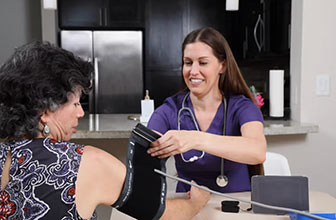Stay Healthy with Preventive Care

What's preventive care?
Preventive care is a proactive approach to your health.
It includes services like your annual physical and screenings for high blood pressure, diabetes, different types of cancer and other diseases or chronic conditions.
Most Blue Cross Blue Shield of Michigan plans cover preventive care. But, before you receive any type of care, make sure you know what your plan pays and what you must pay.
Why it matters
Preventive care can help you avoid serious health issues. It can also minimize the risks and complications of chronic conditions, like diabetes or high cholesterol.
The earlier your doctor can discover any issues you may have, the better your chances at staying healthy.
Whether you need simple bloodwork or a colonoscopy, preventive care could one day save your life.
Preventive care topics
Explore these different types of exams, screenings and ongoing care to learn how you can give yourself the gift of good health.
Schedule your annual physical
Your annual physical is the foundation to your preventive care.
It’s a yearly visit where you talk to your doctor about your overall health and well-being. During your appointment, your doctor will:
- Review your medications
- Check your blood pressure
- Discuss any concerns you have
- Talk about your behavioral health, including substance use, anxiety and depression risks
Be sure to tell your doctor about your family history. It can reveal unique risks you may have and whether you need a screening earlier than usual.

Preventing and managing diabetes
Diabetes screenings are an important part of staying healthy.
If you're managing diabetes or concerned about your risk, here are some appointments and ongoing care you should schedule:
- An A1c test to check your blood sugar average
- An annual retinal eye exam
If you’re concerned about your risk for diabetes, talk to your doctor about your family history and your lifestyle.
If you have diabetes, follow your doctor’s treatment plan and stay up to date with your appointments.

Protect yourself from heart disease
Heart disease, sometimes called cardiovascular disease, includes a variety of conditions that put you at risk for heart attacks, heart failure and stroke.
Regular testing can help reveal any risk factors you may have before they become unmanageable. Your doctor will ask you to take these common tests:
- Blood pressure screening
- Cholesterol test, also known as a lipid panel
With regular monitoring and ongoing care, you can manage your cholesterol and blood pressure numbers and live a healthy life.

Cancer screenings
Regular screenings are fundamental to preventing and treating cancer.
They offer the best chance to find cancer sooner and treat it successfully. When you should get one could depend on your family history and any unique risks you may have.
Here are some important screenings you should consider asking your doctor about:
- Colonoscopies for colorectal cancer
- Pap smears for cervical cancer
- Mammograms for breast cancer
Talk to your doctor to develop a plan for you.

Behavioral health
Whether you're struggling with depression, grief, eating habits or substance use, it's OK to ask for help.
Your mental health is important, and it doesn't just affect your mood. It can have physical outcomes, too.
We have the support you need to help you think and feel better.
Learn more about behavioral health support

Get your flu shot
Your annual flu shot is one of the easiest ways you can stay healthy. It only takes a few minutes, and it can save you time and money from getting sick.
Early fall is the best time to get vaccinated, but peak months for the flu are November through April.
It takes two weeks for this immunization to become effective, so don’t wait.

Schedule your annual physical
Your annual physical is the foundation to your preventive care.
It’s a yearly visit where you talk to your doctor about your overall health and well-being. During your appointment, your doctor will:
- Review your medications
- Check your blood pressure
- Discuss any concerns you have
- Talk about your behavioral health, including substance use, anxiety and depression risks
Be sure to tell your doctor about your family history. It can reveal unique risks you may have and whether you need a screening earlier than usual.

Preventing and managing diabetes
Diabetes screenings are an important part of staying healthy.
If you're managing diabetes or concerned about your risk, here are some appointments and ongoing care you should schedule:
- An A1c test to check your blood sugar average
- An annual retinal eye exam
If you’re concerned about your risk for diabetes, talk to your doctor about your family history and your lifestyle.
If you have diabetes, follow your doctor’s treatment plan and stay up to date with your appointments.

Protect yourself from heart disease
Heart disease, sometimes called cardiovascular disease, includes a variety of conditions that put you at risk for heart attacks, heart failure and stroke.
Regular testing can help reveal any risk factors you may have before they become unmanageable. Your doctor will ask you to take these common tests:
- Blood pressure screening
- Cholesterol test, also known as a lipid panel
With regular monitoring and ongoing care, you can manage your cholesterol and blood pressure numbers and live a healthy life.

Cancer screenings
Regular screenings are fundamental to preventing and treating cancer.
They offer the best chance to find cancer sooner and treat it successfully. When you should get one could depend on your family history and any unique risks you may have.
Here are some important screenings you should consider asking your doctor about:
- Colonoscopies for colorectal cancer
- Pap smears for cervical cancer
- Mammograms for breast cancer
Talk to your doctor to develop a plan for you.

Behavioral health
Whether you're struggling with depression, grief, eating habits or substance use, it's OK to ask for help.
Your mental health is important, and it doesn't just affect your mood. It can have physical outcomes, too.
We have the support you need to help you think and feel better.
Learn more about behavioral health support

Get your flu shot
Your annual flu shot is one of the easiest ways you can stay healthy. It only takes a few minutes, and it can save you time and money from getting sick.
Early fall is the best time to get vaccinated, but peak months for the flu are November through April.
It takes two weeks for this immunization to become effective, so don’t wait.

Prevention is the best medicine
Source: Centers for Disease Control and Prevention and American Cancer Society

Support with quitting tobacco
Quitting tobacco is important, but staying the course can be tough.
Blue Cross offers a tobacco cessation program designed to help you set goals and inspire positive changes.
With an experienced coach, you'll get personalized support to help you quit smoking, vaping or using nicotine.

Choosing Health Screenings by Age
Learn the recommended health screenings for your age to stay up to date.
Read about screenings
How to Stay Up to Date on Preventive Care
Learn more about how to plan for the exams and screenings you need.
Read about planning ahead
Hidden Signs of Heart Disease
Early detection of heart disease can help you maintain long-term health.
Read about heart disease